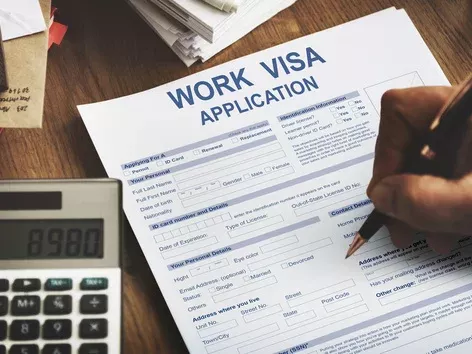
Relocating for work often requires obtaining a work visa, and the process varies across countries.
Some European nations have simplified visa requirements, making it easier for foreign professionals to secure employment and legal work authorization.
A work visa grants individuals the right to live and work in a foreign country, with eligibility depending on factors such as employment status, skill level, and employer sponsorship. Countries with streamlined work visa processes aim to attract skilled professionals to fill labor market gaps and boost economic growth.
According to Visaguide, the following eight European countries have some of the most accessible work visa policies.
Estonia
It has a high approval rate for work visa applications, receiving fewer requests than many other European nations. Foreign professionals can apply for a D visa for short-term work or start working immediately upon arrival while applying for a residence permit.
Job opportunities are frequently listed on the Work in Estonia platform.
Lithuania
This is an attractive destination for immigrant workers. Applicants need a job offer before applying, and employers submit work permit applications to the Lithuanian Labour Exchange. Certain highly skilled non-EU professionals can work without a permit, provided they meet specific labour market requirements. They apply for a temporary residence permit instead of a national or work visa.
Iceland
Iceland is a top choice for professionals seeking an excellent work-life balance. Applicants must secure a work contract before applying for a visa. The country offers multiple work permits, including those for specialized workers, labor shortages, athletes, students, and family reunification cases.
Latvia
Foreign workers in Latvia require a residence permit, a Type D visa, and a work permit, unless they fall into exempt categories such as Latvian company shareholders or permanent residence holders. Work permit types include; type A which is for employment with a Latvian company, types C & E which are for intra-company transfers, type D for business visits and the seasonal work visa which is for temporary employment.
Slovakia
Slovakia’s growing economy makes it an appealing destination for job seekers. The country offers a single permit (a combined work and residence permit, requiring a reported job vacancy at least 20 days before application), a work permit which is issued for family reunification cases, seasonal employment visa which is valid for up to 180 days and an EU Blue Card which is for highly skilled professionals.
Luxembourg
Luxembourg provides various visa options, including short-stay Schengen Visa (for business activities), a long-stay National Visa (for employment exceeding 90 days) and an EU Blue Card (for highly skilled professionals staying for over 12 months).
With a high minimum wage and low unemployment rate, Luxembourg remains a desirable destination for foreign workers.
Czechia (Czech Republic)
Czechia attracts skilled professionals due to its strong economy. Work visa options include an employee card (issued for specific job positions, valid for two years), an EU Blue Card (for university graduates), an intra-company transfer card (for multinational company employees) and a type D business visa (for self-employed individuals)
Certain foreign nationals, such as family members of EU Blue Card holders, may access the labour market freely.
Germany
Germany is known for its diverse workforce and its policies that are immigrant-friendly. Applicants can apply for a long-stay visa if they have a job offer, plan to establish a business or work as freelancers, seek employment upon arrival, qualify for an au pair program or apply for a working holiday visa (available to specific nationalities).
Germany recently introduced an “opportunity card,” allowing foreign nationals to enter the country without a prior job offer and search for employment.
Securing a work visa in Europe varies in complexity depending on country-specific policies and job market demands. These eight nations provide more accessible pathways for foreign professionals, whether through fast-tracked application processes, employer sponsorships, or residency options. As the global workforce continues to evolve, these countries remain key destinations for skilled workers seeking new career opportunities.


